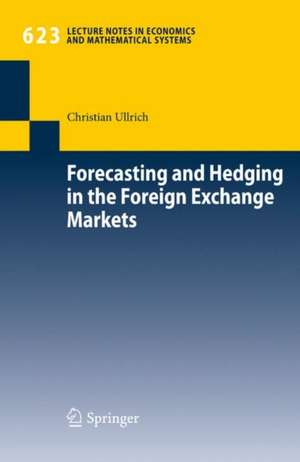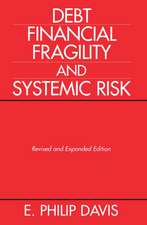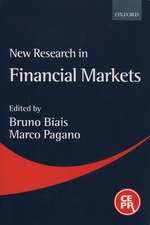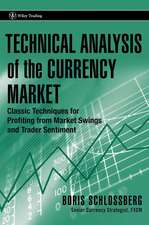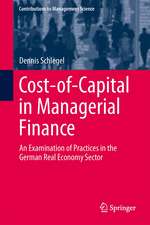Forecasting and Hedging in the Foreign Exchange Markets: Lecture Notes in Economics and Mathematical Systems, cartea 623
Autor Christian Ullrichen Limba Engleză Paperback – 12 iun 2009
Din seria Lecture Notes in Economics and Mathematical Systems
-
 Preț: 360.02 lei
Preț: 360.02 lei -
 Preț: 383.93 lei
Preț: 383.93 lei - 15%
 Preț: 693.39 lei
Preț: 693.39 lei -
 Preț: 384.09 lei
Preț: 384.09 lei -
 Preț: 380.07 lei
Preț: 380.07 lei -
 Preț: 446.26 lei
Preț: 446.26 lei -
 Preț: 497.37 lei
Preț: 497.37 lei -
 Preț: 380.84 lei
Preț: 380.84 lei -
 Preț: 384.86 lei
Preț: 384.86 lei -
 Preț: 378.34 lei
Preț: 378.34 lei -
 Preț: 399.67 lei
Preț: 399.67 lei - 20%
 Preț: 360.93 lei
Preț: 360.93 lei - 15%
 Preț: 643.16 lei
Preț: 643.16 lei -
 Preț: 379.09 lei
Preț: 379.09 lei -
 Preț: 404.76 lei
Preț: 404.76 lei -
 Preț: 385.62 lei
Preț: 385.62 lei - 15%
 Preț: 644.49 lei
Preț: 644.49 lei -
 Preț: 379.09 lei
Preț: 379.09 lei -
 Preț: 345.50 lei
Preț: 345.50 lei -
 Preț: 425.80 lei
Preț: 425.80 lei -
 Preț: 378.34 lei
Preț: 378.34 lei - 18%
 Preț: 775.65 lei
Preț: 775.65 lei -
 Preț: 392.60 lei
Preț: 392.60 lei -
 Preț: 401.61 lei
Preț: 401.61 lei - 15%
 Preț: 646.43 lei
Preț: 646.43 lei -
 Preț: 382.18 lei
Preț: 382.18 lei -
 Preț: 378.34 lei
Preț: 378.34 lei - 15%
 Preț: 637.59 lei
Preț: 637.59 lei - 15%
 Preț: 647.27 lei
Preț: 647.27 lei -
 Preț: 377.73 lei
Preț: 377.73 lei -
 Preț: 447.84 lei
Preț: 447.84 lei - 15%
 Preț: 644.49 lei
Preț: 644.49 lei -
 Preț: 386.00 lei
Preț: 386.00 lei - 15%
 Preț: 654.43 lei
Preț: 654.43 lei -
 Preț: 415.02 lei
Preț: 415.02 lei -
 Preț: 411.54 lei
Preț: 411.54 lei -
 Preț: 398.92 lei
Preț: 398.92 lei -
 Preț: 398.92 lei
Preț: 398.92 lei -
 Preț: 392.75 lei
Preț: 392.75 lei - 15%
 Preț: 635.47 lei
Preț: 635.47 lei - 20%
 Preț: 653.56 lei
Preț: 653.56 lei -
 Preț: 379.86 lei
Preț: 379.86 lei -
 Preț: 495.46 lei
Preț: 495.46 lei -
 Preț: 447.99 lei
Preț: 447.99 lei -
 Preț: 378.71 lei
Preț: 378.71 lei - 15%
 Preț: 637.13 lei
Preț: 637.13 lei -
 Preț: 385.84 lei
Preț: 385.84 lei -
 Preț: 378.54 lei
Preț: 378.54 lei - 15%
 Preț: 666.55 lei
Preț: 666.55 lei
Preț: 384.86 lei
Nou
Puncte Express: 577
Preț estimativ în valută:
73.65€ • 79.97$ • 61.87£
73.65€ • 79.97$ • 61.87£
Carte tipărită la comandă
Livrare economică 22 aprilie-06 mai
Preluare comenzi: 021 569.72.76
Specificații
ISBN-13: 9783642004940
ISBN-10: 3642004946
Pagini: 228
Ilustrații: XVIII, 207 p. 43 illus.
Dimensiuni: 155 x 235 x 12 mm
Greutate: 0.34 kg
Ediția:2009
Editura: Springer Berlin, Heidelberg
Colecția Springer
Seria Lecture Notes in Economics and Mathematical Systems
Locul publicării:Berlin, Heidelberg, Germany
ISBN-10: 3642004946
Pagini: 228
Ilustrații: XVIII, 207 p. 43 illus.
Dimensiuni: 155 x 235 x 12 mm
Greutate: 0.34 kg
Ediția:2009
Editura: Springer Berlin, Heidelberg
Colecția Springer
Seria Lecture Notes in Economics and Mathematical Systems
Locul publicării:Berlin, Heidelberg, Germany
Public țintă
Professional/practitionerCuprins
Motivation.- Analytical Outlook.- Foreign Exchange Market Predictability.- Equilibrium Relationships.- Market Efficiency Concepts.- Views from Complexity Theory.- Conclusions.- Exchange Rate Forecasting with Support Vector Machines.- Statistical Analysis of Daily Exchange Rate Data..- Support Vector Classification.- Description of Empirical Study and Results.- Exchange Rate Hedging in a Simulation/Optimization Framework.- Preferences over Probability Distributions.- Problem Statement and Computational Complexity.- Model Implementation.- Simulation/Optimization Experiments.- Contributions of the Dissertation.- Exchange Rate Forecasting with Support Vector Machines.- References.- Exchange Rate Hedging in a Simulation/Optimization Framework.
Textul de pe ultima copertă
The growing complexity of many real world problems is one of the biggest challenges of our time. The area of international finance is one prominent example where decision making is often fraud to mistakes, and tasks such as forecasting, trading and hedging exchange rates seem to be too difficult to expect correct or at least adequate decisions. From the high complexity of the foreign exchange market and related decision problems, the author derives the necessity to use tools from Machine Learning and Artificial Intelligence, e.g. Support Vector Machines, and to combine such methods with sophisticated financial modelling techniques. The suitability of this combination of ideas is demonstrated by an empirical study and by simulation.
